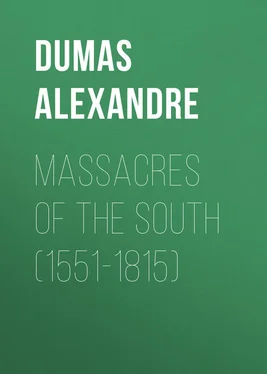Alexandre Dumas - Massacres of the South (1551-1815)
Здесь есть возможность читать онлайн «Alexandre Dumas - Massacres of the South (1551-1815)» — ознакомительный отрывок электронной книги совершенно бесплатно, а после прочтения отрывка купить полную версию. В некоторых случаях можно слушать аудио, скачать через торрент в формате fb2 и присутствует краткое содержание. Жанр: literature_19, foreign_antique, foreign_prose, на английском языке. Описание произведения, (предисловие) а так же отзывы посетителей доступны на портале библиотеки ЛибКат.
- Название:Massacres of the South (1551-1815)
- Автор:
- Жанр:
- Год:неизвестен
- ISBN:нет данных
- Рейтинг книги:3 / 5. Голосов: 1
-
Избранное:Добавить в избранное
- Отзывы:
-
Ваша оценка:
- 60
- 1
- 2
- 3
- 4
- 5
Massacres of the South (1551-1815): краткое содержание, описание и аннотация
Предлагаем к чтению аннотацию, описание, краткое содержание или предисловие (зависит от того, что написал сам автор книги «Massacres of the South (1551-1815)»). Если вы не нашли необходимую информацию о книге — напишите в комментариях, мы постараемся отыскать её.
Massacres of the South (1551-1815) — читать онлайн ознакомительный отрывок
Ниже представлен текст книги, разбитый по страницам. Система сохранения места последней прочитанной страницы, позволяет с удобством читать онлайн бесплатно книгу «Massacres of the South (1551-1815)», без необходимости каждый раз заново искать на чём Вы остановились. Поставьте закладку, и сможете в любой момент перейти на страницу, на которой закончили чтение.
Интервал:
Закладка:
The Protestants took what they were offered, but of course like all who accept benefits they went away filled with discontent because they had not been given more.
Although the Protestants ever afterwards looked on Henri IV as a renegade, his reign nevertheless was their golden age, and while it lasted Nines was quiet; for, strange to say, the Protestants took no revenge for St. Bartholomew, contenting themselves with debarring the Catholics from the open exercise of their religion, but leaving them free to use all its rites and ceremonies in private. They even permitted the procession of the Host through the streets in case of illness, provided it took place at night. Of course death would not always wait for darkness, and the Host was sometimes carried to the dying during the day, not without danger to the priest, who, however, never let himself be deterred thereby from the performance of his duty; indeed, it is of the essence of religious devotion to be inflexible; and few soldiers, however brave, have equalled the martyrs in courage.
During this time, taking advantage of the truce to hostilities and the impartial protection meted out to all without distinction by the Constable Damville, the Carmelites and Capuchins, the Jesuits and monks of all orders and colours, began by degrees to return to Nines; without any display, it is true, rather in a surreptitious manner, preferring darkness to daylight; but however this may be, in the course of three or four years they had all regained foothold in the town; only now they were in the position in which the Protestants had been formerly, they were without churches, as their enemies were in possession of all the places of worship. It also happened that a Jesuit high in authority, named Pere Coston, preached with such success that the Protestants, not wishing to be beaten, but desirous of giving word for word, summoned to their aid the Rev. Jeremie Ferrier, of Alais, who at the moment was regarded as the most eloquent preacher they had. Needless to say, Alais was situated in the mountains, that inexhaustible source of Huguenot eloquence. At once the controversial spirit was aroused; it did not as yet amount to war, but still less could it be called peace: people were no longer assassinated, but they were anathematised; the body was safe, but the soul was consigned to damnation: the days as they passed were used by both sides to keep their hand in, in readiness for the moment when the massacres should again begin.
CHAPTER II
The death of Henri IV led to new conflicts, in which although at first success was on the side of the Protestants it by degrees went over to the Catholics; for with the accession of Louis XIII Richelieu had taken possession of the throne: beside the king sat the cardinal; under the purple mantle gleamed the red robe. It was at this crisis that Henri de Rohan rose to eminence in the South. He was one of the most illustrious representatives of that great race which, allied as it was to the royal houses of Scotland, France, Savoy, and Lorraine; had taken as their device, “Be king I cannot, prince I will not, Rohan I am.”
Henri de Rohan was at this time about forty years of age, in the prime of life. In his youth, in order to perfect his education, he had visited England, Scotland, and Italy. In England Elizabeth had called him her knight; in Scotland James VI had asked him to stand godfather to his son, afterwards Charles I; in Italy he had been so deep in the confidence of the leaders of men, and so thoroughly initiated into the politics of the principal cities, that it was commonly said that, after Machiavel, he was the greatest authority in these matters. He had returned to France in the lifetime of Henry IV, and had married the daughter of Sully, and after Henri’s death had commanded the Swiss and the Grison regiments – at the siege of Juliers. This was the man whom the king was so imprudent as to offend by refusing him the reversion of the office of governor of Poitou, which was then held by Sully, his father-in-law. In order to revenge himself for the neglect he met with at court, as he states in his Memoires with military ingenuousness, he espoused the cause of Conde with all his heart, being also drawn in this direction by his liking for Conde’s brother and his consequent desire to help those of Conde’s religion.
From this day on street disturbances and angry disputes assumed another aspect: they took in a larger area and were not so readily appeased. It was no longer an isolated band of insurgents which roused a city, but rather a conflagration which spread over the whole South, and a general uprising which was almost a civil war.
This state of things lasted for seven or eight years, and during this time Rohan, abandoned by Chatillon and La Force, who received as the reward of their defection the field marshal’s baton, pressed by Conde, his old friend, and by Montmorency, his consistent rival, performed prodigies of courage and miracles of strategy. At last, without soldiers, without ammunition, without money, he still appeared to Richelieu to be so redoubtable that all the conditions of surrender he demanded were granted. The maintenance of the Edict of Nantes was guaranteed, all the places of worship were to be restored to the Reformers, and a general amnesty granted to himself and his partisans. Furthermore, he obtained what was an unheard-of thing until then, an indemnity of 300,000 livres for his expenses during the rebellion; of which sum he allotted 240,000 livres to his co-religionists – that is to say, more than three-quarters of the entire amount – and kept, for the purpose of restoring his various chateaux and setting his domestic establishment, which had been destroyed during the war, again on foot, only 60,000 livres. This treaty was signed on July 27th, 1629.
The Duc de Richelieu, to whom no sacrifice was too great in order to attain his ends, had at last reached the goal, but the peace cost him nearly 40,000,000 livres; on the other hand, Saintonge, Poitou, and Languedoc had submitted, and the chiefs of the houses of La Tremouille, Conde, Bouillon, Rohan, and Soubise had came to terms with him; organised armed opposition had disappeared, and the lofty manner of viewing matters natural to the cardinal duke prevented him from noticing private enmity. He therefore left Nimes free to manage her local affairs as she pleased, and very soon the old order, or rather disorder, reigned once more within her walls. At last Richelieu died, and Louis XIII soon followed him, and the long minority of his successor, with its embarrassments, left to Catholics and Protestants in the South more complete liberty than ever to carry on the great duel which down to our own days has never ceased.
But from this period, each flux and reflux bears more and more the peculiar character of the party which for the moment is triumphant; when the Protestants get the upper hand, their vengeance is marked by brutality and rage; when the Catholics are victorious, the retaliation is full of hypocrisy and greed. The Protestants pull down churches and monasteries, expel the monks, burn the crucifixes, take the body of some criminal from the gallows, nail it on a cross, pierce its side, put a crown of thorns round its temples and set it up in the market-place – an effigy of Jesus on Calvary. The Catholics levy contributions, take back what they had been deprived of, exact indemnities, and although ruined by each reverse, are richer than ever after each victory. The Protestants act in the light of day, melting down the church bells to make cannon to the sound of the drum, violate agreements, warm themselves with wood taken from the houses of the cathedral clergy, affix their theses to the cathedral doors, beat the priests who carry the Holy Sacrament to the dying, and, to crown all other insults, turn churches into slaughter-houses and sewers.
Читать дальшеИнтервал:
Закладка:
Похожие книги на «Massacres of the South (1551-1815)»
Представляем Вашему вниманию похожие книги на «Massacres of the South (1551-1815)» списком для выбора. Мы отобрали схожую по названию и смыслу литературу в надежде предоставить читателям больше вариантов отыскать новые, интересные, ещё непрочитанные произведения.
Обсуждение, отзывы о книге «Massacres of the South (1551-1815)» и просто собственные мнения читателей. Оставьте ваши комментарии, напишите, что Вы думаете о произведении, его смысле или главных героях. Укажите что конкретно понравилось, а что нет, и почему Вы так считаете.












